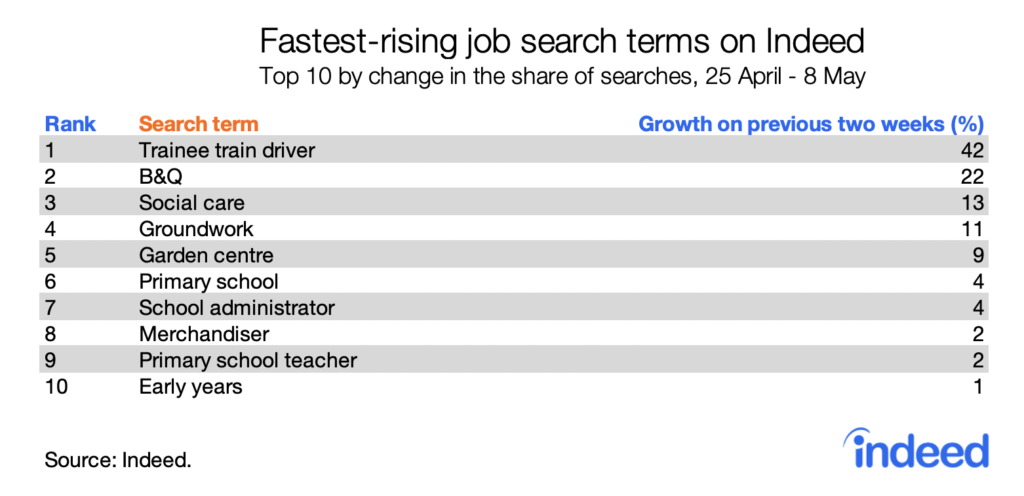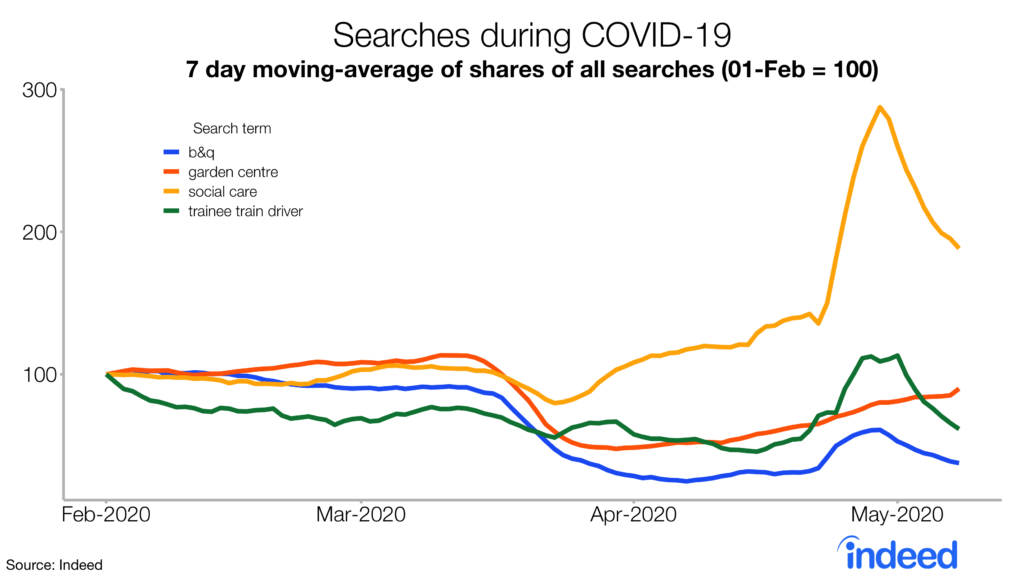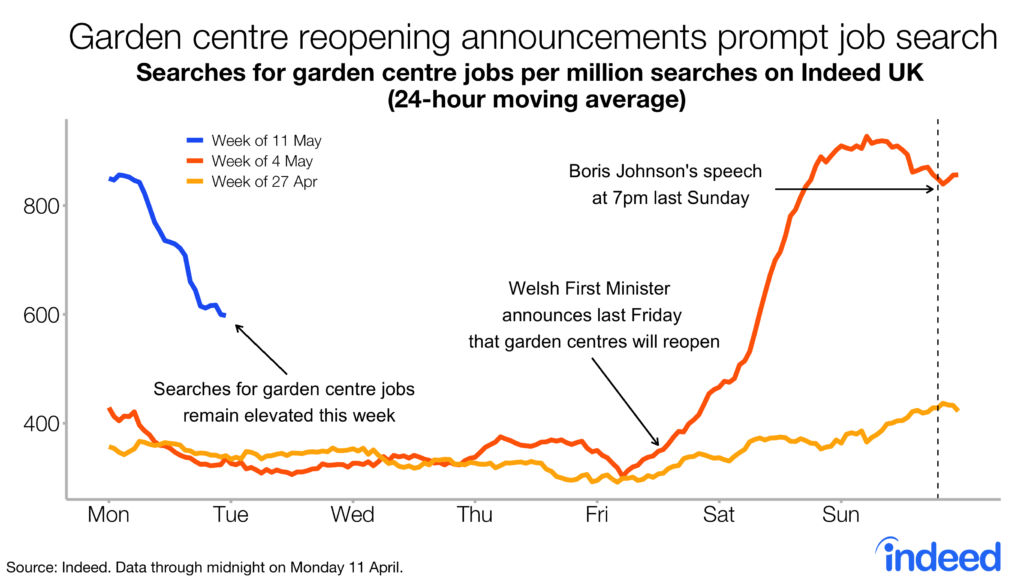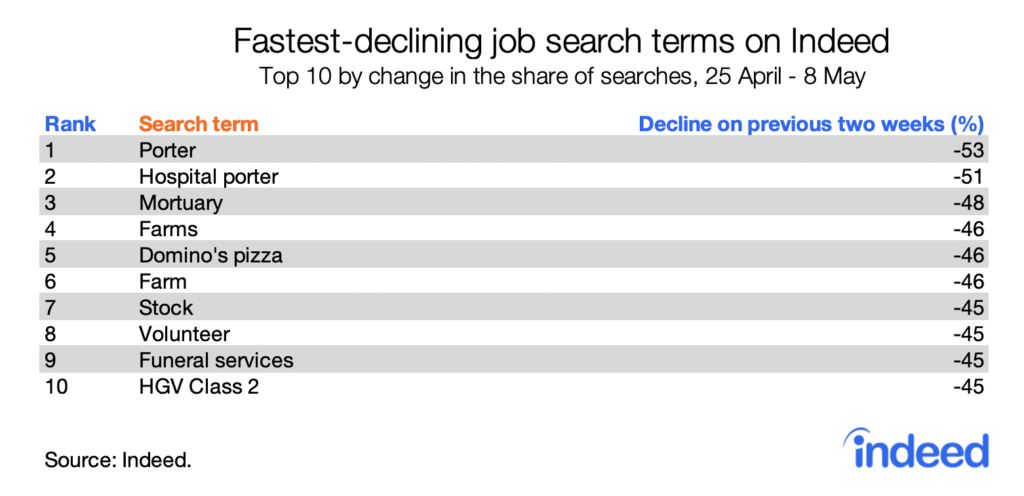Key Points:
- Jobseeker search patterns are shifting towards sectors where activity is set to resume.
- Trainee train drivers, DIY stores, garden centres and social care see rising interest.
- Searches shifting away from porters, funeral services and farm work.
The shock to the UK labour market from coronavirus has resulted in job losses, but also a marked slowdown in new vacancies. In this difficult environment, we have seen jobseekers react quickly to news of hiring announcements. Looking at which search terms have been rising in popularity the fastest gives a snapshot of the types of positions jobseekers have been focusing their efforts on and tells us about the state of the labour market.
Sectors set to reopen early see rising jobseeker searches

The fastest rising job search on Indeed during the two weeks to Friday was for trainee train drivers. Rail operators and the government plan to increase train services over the coming weeks as part of plans for more people to return to work. Though service levels will remain below where they were pre-crisis, it appears that jobseekers may be hoping for some entry-level opportunities to arise.
The second-fastest rising search term was B&Q. The DIY chain has recently reopened many of its stores across the country with social-distancing measures in place, and has seen rising jobseeker interest. Searches for social care roles also increased over the two-week period to Friday, perhaps driven by the government campaign to boost the adult social care workforce. However, all of the top three search terms actually saw interest peak just before the turn of the month, with search activity easing in the first week of May. In contrast, searches for garden centre jobs have continued to rise into May amid growing expectations that these establishments would be allowed to reopen early.

Media reports last week indicated that this would be the case, and the Welsh First Minister made an announcement on Friday on the reopening of garden centres in Wales. Though there was no mention of garden centres in the UK Prime Minister’s widely-anticipated update on Sunday, it has subsequently been confirmed by the government that garden centres will be allowed to reopen this week.

Some of the current search activity may be affected by seasonal variations. For instance, teachers usually search for new jobs in the spring. Primary school teaching jobs saw small increases in jobseeker search over the latest period, though no date has yet been set for school reopenings.
To get a broader sense of how Covid-19 has affected job search, while removing seasonal effects, we can compare current search terms with the same period last year. Searches for teaching jobs are broadly in line with last year’s patterns.
Searches for remote working, however, have seen a large increase compared with one year ago (up 473%). Meanwhile, ‘supermarket’ searches are up 389% on last year and ‘farm worker’ searches are up 243%.
Search activity shifting away from porters, funeral services and farm work
While search activity has been rising for some types of jobs, it has been falling elsewhere.
Searches for supermarket jobs are well above last year’s levels but they have been among the fastest declining search terms over the past fortnight. There was an initial rush for these jobs in the early stages of lockdown, but these roles have now been largely filled and jobseeker interest has been shifting elsewhere.
Searches for porters and hospital porters fell more than -50% over the two weeks to Friday, while mortuary and funeral services also saw falls. Farm work, Domino’s pizza, voluntary and HGV drivers were also among the jobs seeing the fastest declines in jobseeker interest. In some cases, this may reflect opportunities that had arisen over the previous few weeks having already been filled.

Compared to one year ago, searches for jobs in the hospitality sector are down sharply, as these establishments remain shuttered. For example, searches for bar staff are down -92%, while waitress and cafe searches are down -86% and barista searches down -84%. Meanwhile, searches for summer jobs are down -90%.
Job search patterns are changing quickly in response to the forced reshaping of the economy. Whereas large swathes of the job market have gone into hibernation, certain pockets of opportunity have sprung up elsewhere. Job seekers have responded swiftly, in many cases aided by media attention on those sectors with roles to fill. With the public health crisis set to stay with us for some time, employers who can offer remote working can benefit from increased jobseeker interest.
Methodology
For this analysis, we looked at the top search terms on Indeed UK as a share of all searches from April 25 to May 8. We looked at both the change in searches versus the previous two weeks and the change versus the same period one year ago to account for possible seasonality of search patterns. We accounted for fluctuations in search behaviour by calculating the 7-day moving average of each term’s search share.






